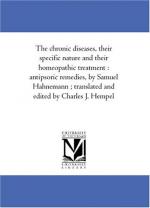|
This section contains 1,975 words (approx. 7 pages at 300 words per page) |

|
Encyclopedia of World Biography on Samuel Hahnemann
Samuel Hahnemann (1755-1843), a 19th century German physician and chemist, developed homeopathy, a form of medicine that uses minute doses of herbs and other substances to promote healing.
Appalled by the barbaric and violent medical practices of the time and concerned for the health of his growing family, Hahnemann spent years conducting experiments to study the healing properties of various materials. He believed that small doses of natural drugs could provoke symptoms of the diseases they sought to cure, prompting the body's own immune system to heal itself. The practice of homeopathy grew from this theory, based on Hahnemann's thesis that "like cures like." The doctor devoted his life to homeopathy, conducting endless tests, promoting his theories, and battling detractors. Homeopathy flourished around the world. Its popularity peaked in the United States in the early 1900s, then suffered a sharp decline due to protests from proponents of modern...
|
This section contains 1,975 words (approx. 7 pages at 300 words per page) |

|


